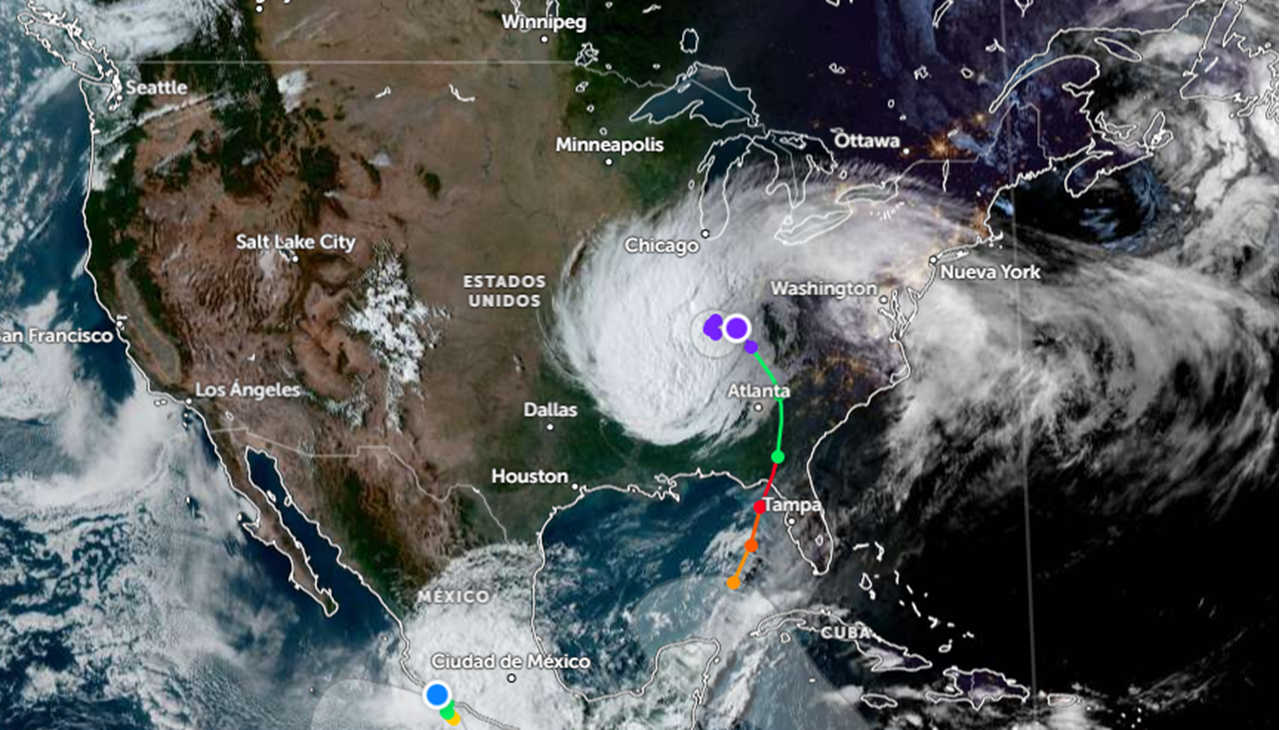
Helene's lethal impact
The meteorological phenomenon caused 33 deaths and a great deal of damage in southeast cities.
The death toll from Hurricane Helene rose Friday to at least 33 people across the southeastern United States, authorities said, as torrential flooding inundated communities and emergency responders launched massive rescue operations.
Roads, homes and businesses were underwater after the enormous storm made landfall near the Florida state capital Tallahassee overnight and surged north, knocking out power for millions of customers.
And while Helene, a Category 4 hurricane, weakened to a tropical storm and eventually a tropical depression it has continued to wreak havoc across multiple states, hammering them with heavy winds and rain that the National Hurricane Center described as "life-threatening conditions."
The Miami-based NHC reported the storm was "still producing historic and catastrophic flooding" and warned of flash floods in Georgia's largest city Atlanta, as well as in South Carolina, North Carolina and Tennessee.
Up to 12 inches (30 centimeters) of rain was forecast in the Appalachian mountains, with isolated spots even receiving 20 inches.
In South Carolina at least 14 people have died, including two firefighters, officials said. Four of the fatalities were related to "trees falling through the roof of the homes," said Darryl Ables, the coroner in Aiken County.
Georgia Governor Brian Kemp reported 11 killed in his state, including an emergency responder, and he warned that the city of Valdosta had identified 115 heavily damaged structures with multiple people trapped inside.
Florida's toll stood at seven. Governor Ron DeSantis said the damage from Helene exceeded that of hurricanes Idalia and Debby, which both hit the same Big Bend region southeast of Tallahasee in the last 13 months.
"It's a real gut-punch to those communities," DeSantis told Fox News.
In Perry, near where Helene slammed ashore bearing winds of 140 miles (225 kilometers) per hour, houses lost power and the gas station was flattened.
"I am Floridian, so I'm kind of used to it, but it was real scary at one point," said Larry Bailey, 32, who sheltered in his small wooden home all night with his two nephews and sister.
"It's like, was my house gonna get blown away or not?"
Four hundred miles to the north in the Tennessee town of Erwin, a dramatic rescue operation was unfolding as raging floodwaters left a hospital dangerously isolated and more than 50 patients and staff trapped on the roof, according to local television footage.
'It looks bad'
With typhoon Yagi battering Asia, storm Boris drenching Europe and extreme flooding in the Sahel, September so far has been an unusually wet month around the world.
Scientists link some extreme weather events to human-caused global warming.
"Helene traveled over exceptionally warm ocean waters in the Gulf of Mexico," Andra Garner, a climate scientist at Rowan University in New Jersey, told AFP.
"It's likely that those extra warm ocean waters played a role in Helene's rapid intensification."
RELATED CONTENT
"Storm surges are getting worse," Garner said, "because our sea levels are rising as we warm the planet."
Curtis Drafton, a search and rescue volunteer in Steinhatchee, Florida, raised similar concerns as he tackled the storm's aftermath.
"We have got to start wondering: is this the new normal? Is it going to happen every year?" the 48-year-old told AFP.
"We have a lot of talk about once-in-a-lifetime storm, but we had one similar last year.
"We had a 9-foot (2.7-meter) storm surge, two feet over my head plus a little bit more. This dock here got shredded," Drafton said.
Some residents in Atlanta resorted to bailing water out of ground-floor windows with buckets, while near Tampa in Florida, boats were left stranded in gardens.
Five million homes and businesses were without power across a huge swath of the country: Florida, Georgia, the Carolinas, Virginia, Tennessee, Kentucky, Ohio and West Virginia, according to tracking site PowerOutage.us.
In the impact zone, residents had been warned of "unsurvivable" storm surge.
President Joe Biden and state authorities had urged people to heed official evacuation warnings before Helene hit, though some chose to stay in their homes to wait out the storm.
"It looks bad," Biden told reporters Friday.
DeSantis said "hundreds of search and rescue missions were conducted by state personnel," while the head of the Federal Emergency Management Agency, Deanne Criswell, said "we've done over 600 rescues," many of them still ongoing.
© Agence France-Presse By Gerard MARTINEZ, with Lucie AUBOURG in Washington











LEAVE A COMMENT:
Join the discussion! Leave a comment.